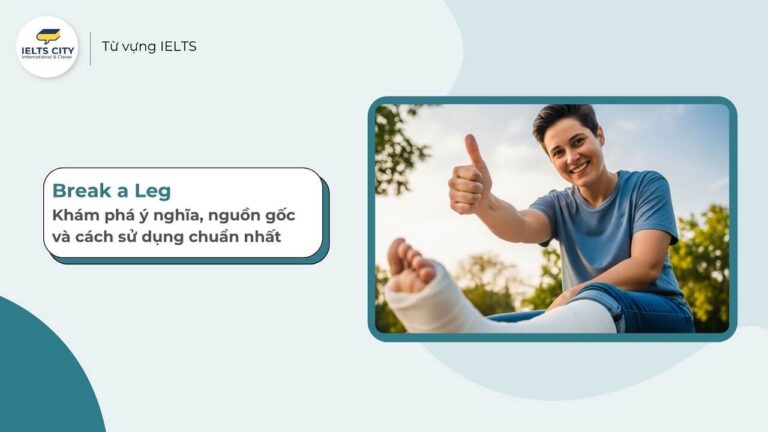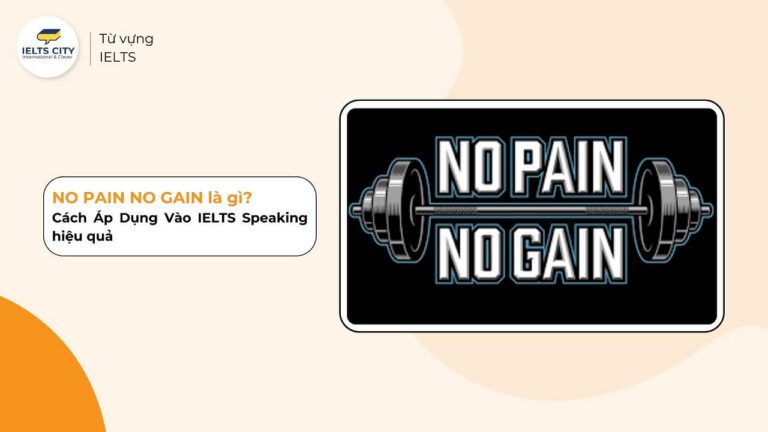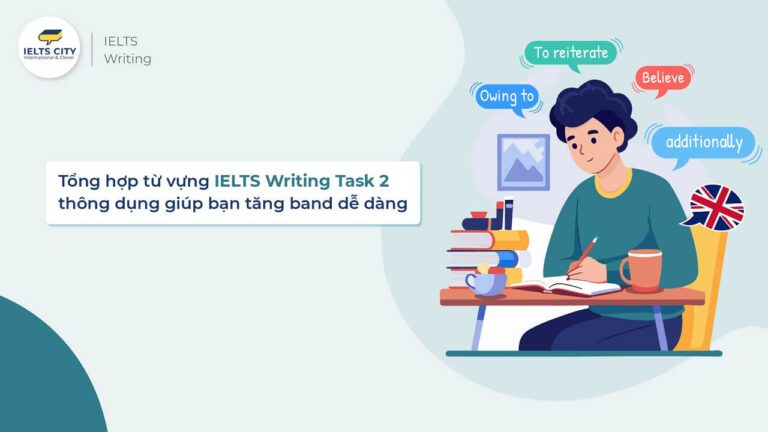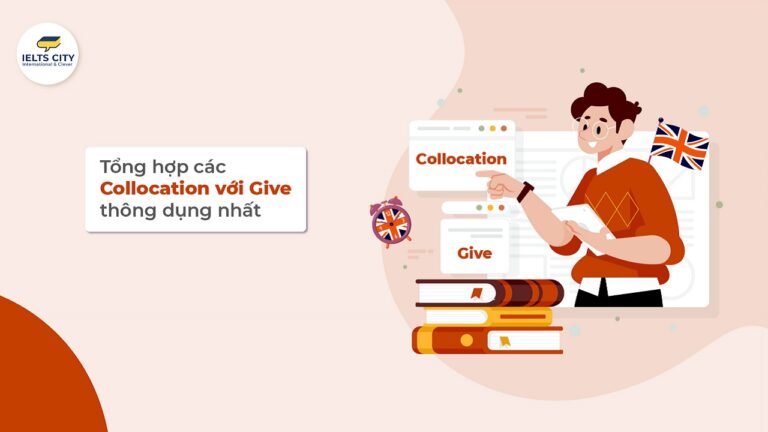Health (sức khỏe) là một trong những chủ đề rất phổ biến trong IELTS Speaking và Writing. Để có thể ghi điểm tốt hơn trong chủ đề này, các bạn cần phải trang bị thêm cho mình các từ vựng đa dạng về chủ đề này. Vì vậy, các bạn hãy cùng IELTS CITY tham khảo tổng hợp từ vựng IELTS về chủ đề Health trong bài viết sau để giúp các bạn dễ dàng xử lý khi gặp chủ đề này trong kỳ thi IELTS sắp tới nhé.
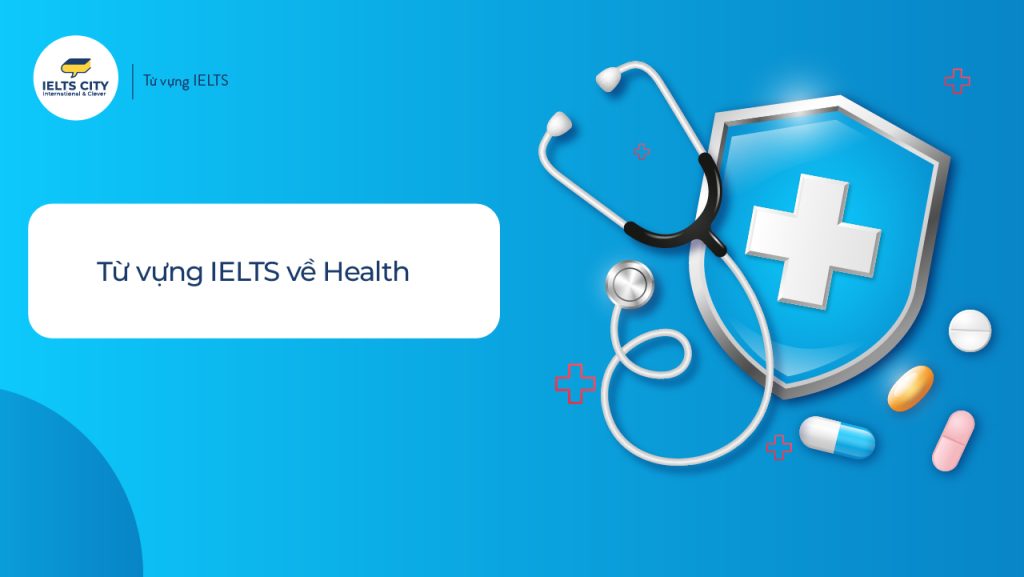
Nội dung chính
Toggle1. Từ vựng IELTS về chủ đề Health
1.1. Từ vựng về giải phẫu học (Anatomy)
- Muscle [n]: cơ bắp
- Skeleton [n]: bộ xương
- Heart [n]: trái tim
- Brain [n]: não
- Lung [n]: phổi
- Liver [n]: lá lách
- Kidney [n]: thận
- Pancreas [n]: tụy
- Intestines [n]: ruột
- Nerves [n]: dây thần kinh
Ví dụ:
1. Regular exercise not only strengthens your muscles and supports your skeleton, but also improves the function of vital organs like the heart, lungs, and brain.
(Tập thể dục đều đặn không chỉ giúp tăng cường cơ bắp và hỗ trợ bộ xương, mà còn cải thiện chức năng của các cơ quan quan trọng như tim, phổi và não.)
2. Doctors explained that the patient’s liver, kidneys, and pancreas were functioning normally, but inflammation had affected the intestines and put pressure on the surrounding nerves.
(Các bác sĩ giải thích rằng gan, thận và tụy của bệnh nhân hoạt động bình thường, nhưng tình trạng viêm đã ảnh hưởng đến ruột và gây áp lực lên các dây thần kinh xung quanh.)
Đăng ký nhận tư vấn miễn phí
Ưu đãi học phí lên đến 45%
& Cơ hội nhận ngay 0,1 chỉ vàng 9999
Đăng ký nhận tư vấn miễn phí
Ưu đãi học phí lên đến 45%
________
1.2. Từ vựng về các triệu chứng (Symptons)
- Fever [n]: sốt
- Headache [n]: đau đầu
- Backache [n]: đau lưng
- Toothache [n]: nhức răng
- Hurt [adj,n,v]: Đau
- Nausea [n]: buồn nôn
- Vomiting [n]: nôn mửa
- Fatigue [n]: mệt mỏi
- Pain [n]: đau đớn
- Dizziness [n]: chóng mặt, choáng váng
- Sweating [n]: xuất mồ hôi
- Shortness of breath [n]: khó thở
- Cough [n]: ho
- Sneeze [v]: hắt hơi
- Diarrhea [n]: tiêu chảy
- Constipation [n]: táo bón
- Insomnia [n]: mất ngủ
- Weight loss [n]: sụt cân
- Swelling [n]: sưng
- Skin rash [n]: phát ban trên da
- Sore eyes [n]: đau mắt
- Sore throat [n]: đau họng
- Joint pain [n]: đau khớp
- Muscle weakness [n]: yếu cơ
- Tingling = numbness [n]: tê
- Blackout [n]: xỉu
Ví dụ:
1. I had a high fever and a terrible headache, so I stayed in bed all day.
(Tôi bị sốt cao và đau đầu dữ dội nên đã nằm nghỉ cả ngày.)
2. She complained of backache and fatigue after sitting at her desk for hours.
(Cô ấy than phiền bị đau lưng và mệt mỏi sau nhiều giờ ngồi làm việc.)
1.3. Từ vựng về bệnh tật và rối loạn (Disease and disorder)
- Cancer [n]: bệnh ung thư
- Diabetes [n]: bệnh tiểu đường
- Flu [n]: Cúm
- Asthma [n]: bệnh suyễn
- Arthritis [n]: viêm khớp
- Heart disease [n]: bệnh tim
- Depression [n]: trầm cảm
- Anxiety [n]: lo âu
- Alzheimer’s disease [n]: bệnh Alzheimer (giảm trí nhớ)
- Parkinson’s disease [n]: bệnh Parkinson (run tay)
- Stroke [n]: đột quỵ
- Multiple sclerosis [n]: xơ cứng rải rác
- HIV/AIDS [n]: bệnh HIV
- Malaria [n]: sốt rét
- Tuberculosis [n]: bệnh lao
- Osteoporosis [n]: loãng xương
- Glaucoma [n]: cườm
- Allergies [n]: bệnh dị ứng
- Chronic obstructive pulmonary disease (COPD) [n]: Bệnh phổi tắc nghẽn mãn tính
- Gastroesophageal reflux disease (GERD) [n]: Bệnh trào ngược dạ dày thực quản
- Irritable bowel syndrome (IBS) [n]: Hội chứng ruột kích thích
Ví dụ:
1. My grandfather was diagnosed with diabetes last year, and now he’s also showing early signs of Alzheimer’s disease.
(Ông tôi được chẩn đoán mắc bệnh tiểu đường vào năm ngoái và giờ có dấu hiệu sớm của bệnh Alzheimer.)
2. Many elderly people suffer from arthritis and osteoporosis, which limit their mobility and daily activities.
(Nhiều người lớn tuổi mắc viêm khớp và loãng xương, làm hạn chế khả năng vận động và sinh hoạt hằng ngày.)
1.4. Từ vựn về các phương pháp khám và điều trị
- Medication [n]: kê thuốc
- Surgery [n]: phẫu thuật
- Therapy [n]: trị liệu
- Chemotherapy [n]: hóa trị liệu
- Radiation [n]: phóng xạ
- Dialysis [n]: lọc máu
- Vaccination [n]: tiêm chủng
- MRI (Magnetic Resonance Imaging) [n]: Chụp cộng hưởng từ
- CT (Computed Tomography) scan [n]: chụp CT
- X-ray [n]: chụp x-quang
- Physical therapy [n]: điều trị thể chất
- Occupational therapy [n]: vật lý trị liệu
- Radiation therapy [n]: xạ trị
- Cardiac catheterization [n]: thông tim
- Blood transfusion [n]: truyền máu
- Bronchoscopy [n]: nội soi phế quản
- Endoscopy [n]: nội soi
- Colonoscopy [n]: nội soi đại tràng
- Laparoscopy [n]: phẩu thuật nội soi
Ví dụ:
1. The doctor prescribed medication and scheduled an MRI scan before deciding whether surgery or chemotherapy would be necessary for the patient.
(Bác sĩ kê thuốc và lên lịch chụp MRI trước khi quyết định có cần phẫu thuật hay hóa trị hay không.)
2. After the blood transfusion, she started physical therapy and later had a colonoscopy to check for any internal issues.
(Sau khi truyền máu, cô ấy bắt đầu điều trị thể chất và sau đó nội soi đại tràng để kiểm tra các vấn đề bên trong.)
1.5. Từ vựng nâng cao về sức khỏe
- to phone in sick: call work to explain you won’t be attending work due to illness
- to have a tooth out: nhổ răng
- to catch a cold: bị cảm lạnh (trúng gió)
- a chesty cough: ho tức ngực
- cuts and bruises: minor injuries
- aches and pains: minor pains that continue over a period of time
- GP: General Practitioner (family doctor)
- to make an appointment: to arrange a time to see the doctor
- to go down with a cold: to become ill
- prescription charges: money the patient pays for medicine authorized by a doctor
- to feel poorly: to feel ill
- to be over the worst: to have gotten through the most serious or uncomfortable stage of an illness
- a runny nose: bị chảy mũi
- a check-up: đi kiểm tra sức khỏe
- to go private: to choose to be treated by commercial healthcare rather than by services
- a heavy cold: bị cảm nặng
- to make a speedy recovery: hồi phục nhanh
- to be at death’s door: (informal) to be very ill indeed
- a blocked nose: when the nose has excess fluid due to a cold
- to have a filling: phục hồi răng (trám răng)
Ví dụ:
1. After I caught a cold and developed a chesty cough with a runny nose, I decided to phone in sick and make an appointment with my GP.
(Sau khi bị cảm lạnh kèm ho tức ngực và chảy mũi, tôi quyết định gọi xin nghỉ ốm và đặt lịch hẹn với bác sĩ gia đình.)
2. He had a check-up and paid the prescription charges before getting a filling. Although he felt poorly for a few days, he managed to make a speedy recovery.
(Anh ấy đi kiểm tra sức khỏe và trả tiền thuốc trước khi trám răng. Dù cảm thấy không khỏe trong vài ngày, anh đã hồi phục nhanh chóng.)
Cùng ôn lại các từ vựng chủ đề Health tại video sau nhé:
2. Idioms hay về chủ đề Health
- Run down: mệt mỏi, uể oải.
- As right as rain: khỏe mạnh.
- Frog in one’s throat: bị đau cổ, cảm thấy không nói được.
- Splitting headache: Nhức đầu, đau đầu kinh khủng
- Blind as a bat: mắt kém.
- Dogs are barking: rất đau chân, thấy khó chịu ở chân.
- Back on my feet: Trở lại như trước, khỏe mạnh trở lại, phục hồi trở lại.
- Cast iron stomach: bị đau bụng, đầy bụng, cảm thấy bụng khó chịu.
- Blue around the gills: trông xanh xao ốm yếu
- Under the weather: Cảm thấy mệt mỏi, ốm yếu (thấy như không thích ứng, khó chịu với thời tiết, khó ở trong người)
- As fit as a fiddle: Sức khỏe tốt (tinh thần và cả thể chất).
- Off colour: ốm yếu (trông mặt như không có tí màu sắc nào, mặt tái mét)
- Full of beans: cực kỳ khỏe mạnh, tràn đầy năng lượng.
- Death warmed up: rất ốm yếu.
- Dog – tired/dead tired: rất mệt mỏi
- Drop like flies: thường dùng chỉ bệnh dịch lây lan.
- Out on one’s feet: Cực kỳ mệt mỏi như thể đứng không vững.
- Bag of bones: Rất gầy gò.
- Clean bill of health: cực kỳ khỏe mạnh, không còn vấn đề gì về sức khỏe.
- To be on the mend: đang hồi phục
- to pull a muscle: dùng quá sức lực dẫn tới đau hoặc tổn thương
Ví dụ:
1. I felt completely run down this morning and even had a frog in my throat, so I called in sick. By evening, I was finally back on my feet and feeling as right as rain.
(Sáng nay tôi cảm thấy rất mệt và cổ họng đau rát, nên xin nghỉ. Đến tối thì tôi đã khỏe lại và cảm thấy hoàn toàn bình phục.)
2. He looked off colour and said he was dog-tired after work. Honestly, he seemed like death warmed up, but he’s slowly on the mend now.
(Anh ấy trông tái nhợt và nói là rất mệt sau giờ làm. Thật sự trông như người bệnh nặng, nhưng giờ thì anh đang dần hồi phục.)
3. After jogging too hard, I pulled a muscle and could barely walk. My legs were sore—like my dogs were barking the whole day.
(Sau khi chạy quá sức, tôi bị căng cơ và hầu như không đi nổi. Hai chân đau như thể đang hét lên vậy.)
3. Những câu hỏi thường gặp về chủ đề Health trong IELTS
IELTS CITY gửi tới bạn đọc một số câu hỏi về Health thường gặp trong IELTS Speaking và IELTS Writing
IELTS SPEAKING
Part 1:
- Do you have any unhealthy habits?
- In what ways do you try to stay healthy?
- Is it easy to keep fit where you live?
- What do you think is more important, eating healthy or doing exercise?
Part 2:
Đề 1: Describe a time when you were ill.
You should say :
- when this was
- what were your symptoms were
- how long the illness lasted and say how it affected your life at the time
Đề 2: Describe something you think is important to keep fit and stay healthy.
You should say:
- What it is
- How it helps in staying fit and healthy
- How often you do it (or see people do it)
And explain why you think it is important .
Đề 3: Describe an exercise you know.
You should say:
- What it is
- How itis done
- When you first tried it
- What kind of people it is suitable for
- And explain why you think it is good exercise.
Part 3:
- Do you think people pay enough attention to their health today?
- What costs are involved when you are ill in your country?
- Do you think most people worry more about their health as they get older?
- How can people be encouraged to stay healthy?
- What are the most popular ways of keeping healthy in your country?
IELTS WRITING
Đề 1: Some people believe that it is the responsibility of individuals to take care of their own health and diet. Others however believe that governments should make sure that their citizens have a healthy diet. Discuss both views and give your opinion.
Đề 2: Despite huge improvements in healthcare, the overall standard of physical health in many developed countries is now falling. What could be the reason for this trend, and what can be done to reverse it?
Đề 3: In many countries, children are becoming overweight and unhealthy. Some people think that the government should have the responsibility. To what extent do you agree or disagree?
Đề 4: Nowadays people have cosmetic surgery to improve life. Why do many more people choose these operations? Do you think this is a positive or negative development?
Đề 5: Parents should encourage children to spend less time studying and more time doing physical activities. To what extent do you agree or disagree?
Đề 6: Scientists tell us that some activities are good for health and others are bad. Despite knowing that, millions of people still continue doing unhealthy activities. What are the causes and what are the solutions for this?
Tham khảo các chủ đề từ vựng liên quan đến Health:
- Từ vựng IELTS về chủ đề Food (ăn uống)
- Từ vựng IELTS về chủ đề Sport (thể thao)
- Từ vựng IELTS về chủ đề Environment (Môi trường)
Hy vọng với bảng tổng hợp từ vựng IELTS về Health phía trên của IELTS CITY có thể giúp bạn cải thiện được vốn từ vựng về chủ đề sức khỏe và ghi điểm thật tốt trong IELTS Speaking và Writing. Chúc các bạn chinh phục IELTS thành công!
Nếu các bạn đang tìm kiếm khóa học luyện thi IELTS uy tín tại TPHCM, tham khảo ngay các Khóa học IELTS cam kết đầu ra tại IELTS CITY.



